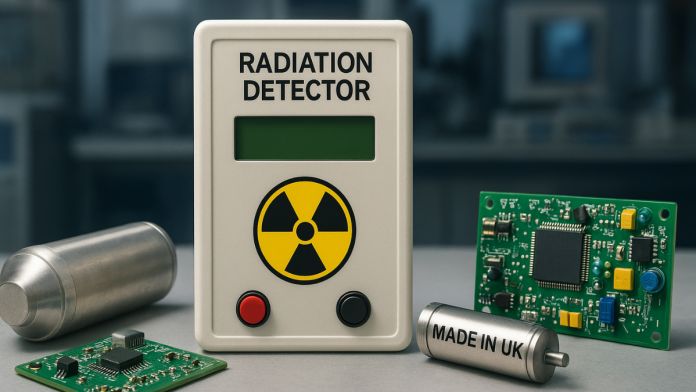A new report has revealed that a company in Iran connected to the country’s defense sector is using UK-made components in radiation-detection devices. The discovery raises concerns about potential sanctions evasion and the use of sensitive Western technology by Iranian defense-linked organizations.
UK Components Found in Iranian Devices
The company, based in Tehran, markets devices that detect radiation. According to the report, these devices contain Geiger-Müller tubes, which are essential parts used to measure radiation. These tubes were manufactured by a UK company based in Croydon, which supplies equipment to the UK Ministry of Defense.
The UK firm has stated that it has strict export-control rules and no record of selling its products directly to Iran. The company said it would investigate how its components ended up in Iranian devices. The discovery highlights a potential loop of sanctions evasion, as Iran has been known to use intermediaries and front companies to obtain restricted Western technology.
The Tehran-based firm is linked to Iran’s defense research sector and produces equipment that is advertised for export. Some of its brochures also promote drones, submarines, and missiles produced by the country’s defense ministry.
Links to Iran’s Defense Research Programs
The company is reportedly connected to Iran’s Organization of Defensive Innovation and Research (SPND), a government research organization that is under US sanctions. The United States has described the SPND as overseeing research with dual-use applications, meaning the technology can be used both for civilian purposes and for nuclear weapons programs.
According to the report, several senior figures within the company are sanctioned by the United States for their work in procuring materials that could have applications in nuclear weapons development. While Iran insists its nuclear program is for peaceful purposes, the connection between the company, its leadership, and Iran’s defense research has raised international concerns.
Some of the firm’s radiation-detection devices are marketed for export through Iran’s defense ministry export agency, which also promotes military equipment such as drones, submarines, and ballistic missiles. This indicates a clear link between Iran’s defense industry and the devices containing Western-made components.
How Sanctions Could Have Been Evaded
It remains unclear how the UK-made parts were obtained by the Iranian company. Experts say Iran has a history of using intermediaries and front companies to acquire sensitive technology despite sanctions. These networks can operate across Europe, Asia, and the Middle East to bypass export controls.
Investigations in the past have found that Iranian-linked front companies in Europe have purchased sensitive components with potential applications in nuclear research. This new case appears to follow a similar pattern, showing how sanctioned entities may access dual-use technology without the knowledge of the original manufacturers.
The UK company involved confirmed that it has no evidence of knowingly supplying Iranian entities. It said it systematically evaluates its customers to prevent the re-export of sensitive components to sanctioned countries.
The case adds to a wider picture of Iranian procurement networks in Europe and Asia. The country’s research and defense organizations have been known to reach out to foreign scientists and companies to acquire technologies that could support nuclear programs. The US has sanctioned more than 30 scientists and multiple entities linked to SPND, citing their involvement in research that could have nuclear-weapons applications.


